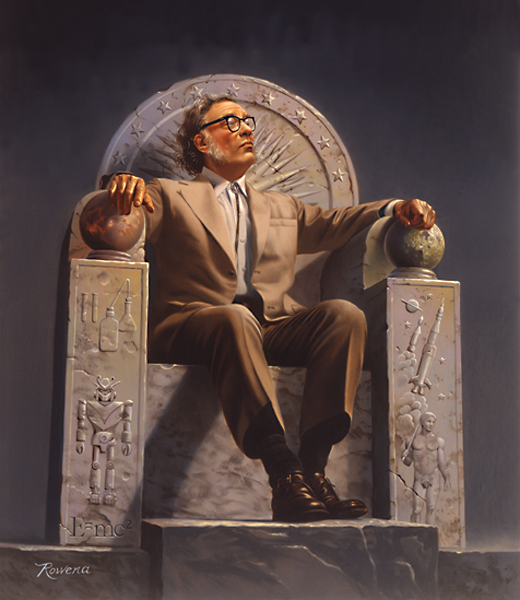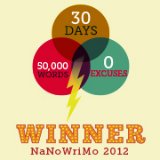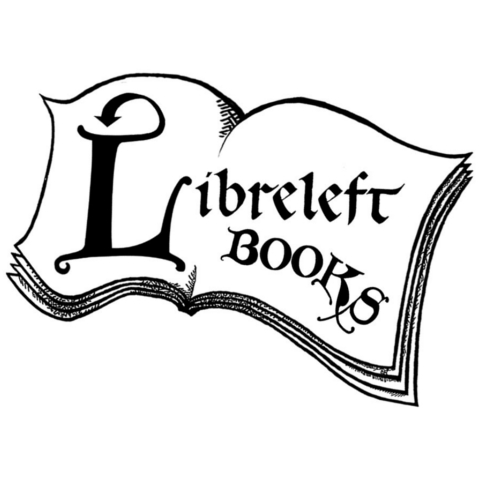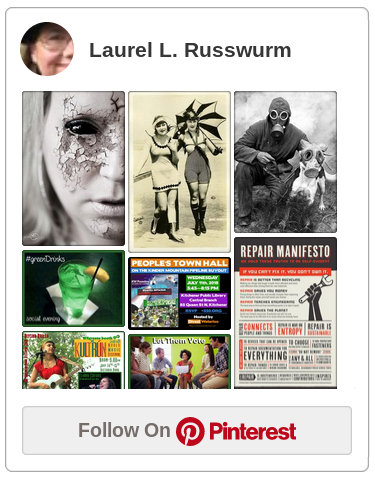Happy Birthday Isaac Asimov

Isaac Asimov
born Isaak Yudovich Ozimov
(circa January 2, 1920 — April 6, 1992)
painting by Rowena Morrill
[reblogged from visual laurel:
Happy Birthday Isaac Asimov]
I may be a little late here, but if memory serves, although January 2nd would have been Isaac Asimov’s birth date of record, it seems to me he told some tale about the actual records being confused due to his family’s emigration from Russia. Whatever else, Asimov was always interesting.
Isaac Asimov was a hugely important influence for me. I loved his books when I first stumbled on “Foundation” in my high school library; Ike took me by the hand and helped me find my way through the worlds of science fiction.
As a reader I loved his bare bones accessible writing style. Devoid of superfluous descriptive padding, his plots were crisp and he wrote just what he needed to bring the story to life.
The good Dr. Asimov’s exploration of robotics throughout his powerful stories was breathtaking, but his non-fiction was excellent, too, because he was brilliant at explaining things so that anyone could understand. (I rather think Malcolm Gladwell is like Asimov without the fiction.)
And I have to say, between Asimov’s stories and non-fiction alike, I learned more science from him than I did from any teacher I ever had in school. My grade nine physics teacher was a dead loss at getting through to me; and I’m certain the only reason I passed was because he didn’t want to have to try again.
Much as I loved science fiction, as a writer, I’ve never dared write in this genre because I’ve always felt I lacked the requisite grounding in science, and always thought the only SF I’d want to write would be hard science fiction. (That may change in future.) When I and my friend, Canadian Trekkies Association co-founder Susan Schmidt, published our very first Star Trek and science fiction Fanzine Canektion in the 1970’s, she tackled the science fiction writing while I handled reviews, art and design. I actually mailed a copy off to the good doctor, and was gobsmacked to receive a personal thank you note on a postcard (with a wonderful “Very impressive looking” quote). One of my greatest regrets was losing that postcard at my very first science fiction convention.
I was quite taken with the glimpses of Isaac Asimov the person through the humour in his Hugo Winners introductions. Yet the only book he wrote that was pretty nearly unreadable was the first volume of his autobiography, “In Memory Yet Green,” I paid big bucks for the hardcover version, but after the agony of struggling through it, I knew nothing would ever entice me to read it again so I gave it away. Fortunately he took a better crack at it in later life with “I, Asimov”
One of the best things about Asimov’s writing is that he wrote characters who were human beings. Better yet, it didn’t matter whether they were men, women or robots. The strong and interesting women characters that Asimov wrote — women like Dr. Susan Calvin, Edith Fellowes and Bayta Darell — certainly made a positive impression on me as a young woman. This was pretty radical for his time, especially when you consider that even today some male authors have difficulty writing plausible female characters. Asimov wrote women who existed in their own right; they weren’t just tossed in to be a damsel in distress, a femme fatale or love interest. They were real people. I’ve often been told my own characters live and breathe, and I think this is in no small part due to his example; he showed me how.
I never tire of Asimov’s stories, and I’ve read some over and over again. Which is why I am saddened by the absence of his work on the shelves of public libraries today. This state of affairs means most of today’s young people will not have the opportunity to stumble across his books the way I did, simply because they aren’t there.
I expect this probably has as much to do with copyright as much as anything. Keep his work locked down tight so as to create an artificial scarcity that will drive the retail price up… a strategy I suspect the great man would not himself have approved. Such market fiddling tends to result in dissipation of a hard won reputation.
The movie version of “I, Robot” was quite a disappointment because the only thing the film makers used of his brilliant book was Asimov’s distinctive title. All I can say is that I am happy Hollywood has kept its fingers off most of his other works. “I, Robot” wasn’t a terrible film, Will Smith is always a joy; it did have a reasonable story, nice special effects and all… actually I might even have liked it if they hadn’t squandered Asimov’s iconic title on a story that bore no resemblance to his seminal collection of robot short stories. And of course the worst thing is that it means that there is now little or no chance of making a proper movie from the book. It would actually have been best as a series of films (or perhaps a mini series) to do the work justice. And that is just too bad.
Isaac Asimov touched my life in many positive ways, and he certainly influenced my decision to become a writer. I just wish I could have thanked him in person.
Image Credit
“Isaac Asimov on Throne” by Rowena Morrill –en:Image:AsimovOnThrone.png, uploaded to en:Wikipedia by en:user:Xiong 14:06, 2 April 2005. Via Wikimedia Commons under the:
GNU Free Documentation License Permission is granted to copy, distribute and/or modify this document under the terms of the GNU Free Documentation License, Version 1.2 or any later version published by the Free Software Foundation; with no Front-Cover Texts, no Back-Cover Texts and with Invariant Sections as indicated. A copy of the license is included in the section entitled “Text of the GNU Free Documentation License.”
























 Project Gutenberg
Project Gutenberg Project Gutenberg Canada
Project Gutenberg Canada